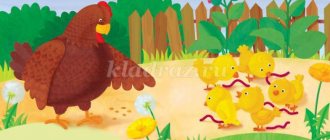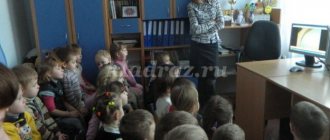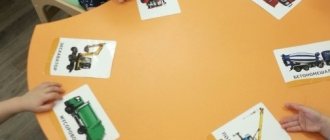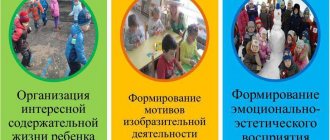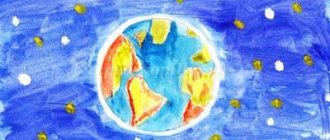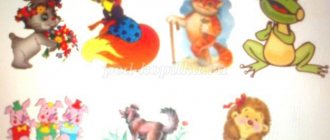Reading and acting out fairy tales
Anastasia Maksimova
Reading and acting out fairy tales
Each of us spends our childhood in the world of role-playing games, which help the child master the rules and laws of adults. Each child plays in his own way, but in their games they all copy adults, their favorite heroes, and try to be like them: the beautiful Zabava, the mischievous Pinocchio, the kind Thumbelina.
Particular importance in kindergarten can and should be given to theatrical
activities, all types of children's theater, because they help:
- form the correct model of behavior in the modern world;
-increase the child’s general culture and introduce him to spiritual values;
-introduce him to children's literature, music, fine arts,
-rules of etiquette, rituals, traditions, instill sustainable interest;
— improve the skill of embodying certain experiences in the game, encourage
creating new images, stimulating thinking.
In addition, theatrical activities are a source of development of feelings,
deep experiences of the child, i.e. it develops the emotional sphere of the child, forcing him to sympathize with the characters and empathize with the events being played out. The shortest path to emotional liberation of a child, removal of constriction, learning to feel and artistic imagination is the path through play, fantasy, and writing. “Theatrical activity is an inexhaustible source of development of feelings, experiences and emotional discoveries of a child, introducing him to spiritual wealth. Staging a fairy tale makes you worry, empathize with the character and events, and in the process of this empathy, certain relationships and moral assessments are created, simply communicated and assimilated” (V. A. Sukhomlinsky)
.
The improvement of speech is also closely related to theatrical activities, since in the process of working on the expressiveness of characters’ remarks and their own statements the child’s vocabulary is imperceptibly activated, the sound culture of his speech and its intonation structure are improved.
A new role, especially the dialogue of characters, confronts the child with the need to express himself clearly, distinctly, and intelligibly. His dialogical speech and its grammatical structure improve, he begins to actively use the dictionary, which, in turn, is also replenished. By participating in theatrical activities, children get acquainted with the world around them in all its diversity through images, colors, sounds, and correctly posed questions force them to think, analyze, draw conclusions and generalizations, and contribute to the development of mental abilities. The love for theater becomes a vivid childhood memory, a feeling of a holiday spent together with peers, parents and teachers in an unusual magical world.
I want to share my experience of how we played out E. Bekhlerova’s fairy tale “The Cabbage Leaf”
The children listened carefully
to the fairy tale , then looked at the illustrations. They answered a number of simple questions, such as: “Why do you think the fairy tale is called the fairy tale end with ?” After they remembered the fairy tale , with the help of my guiding words and showing how to do it, the children easily played it out .
The main objective.
Development of interest in fairy tales , imagination, emotional sphere, gaming skills;
Acting out role-playing dialogues.
Tasks.
Introduce children to the world of play and theater;
Develop the need for self-expression and creativity;
Continue to teach children to listen carefully to a fairy tale and understand its meaning.
Dramatization of the fairy tale “Fedorino’s grief” for children of the preparatory group of kindergarten
Author: Alexandrova Alexandra Evgenievna music director of GBDOU kindergarten No. 4 of Krasnoselsky district of St. Petersburg Description of work: I bring to your attention the script of a theatrical performance for children of senior preschool age with the addition of musical, gaming and logorhythmic exercises. This development can be used by music directors and preschool teachers. Goals and objectives: Education of the rules of etiquette and consolidation of knowledge about sanitary and hygienic skills Development of creative independence and aesthetic taste in conveying an image using means of expressiveness.
Consolidating the ability to move expressively and rhythmically in accordance with the varied nature of music. musical images and the ability to convey a simple rhythmic pattern. Further development of the ability to perform songs expressively, correctly conveying the melody and the skills of choral and solo singing. Fedorushka visiting the guys Presenter: We know all the girls and boys love books very much, They love fairy tales, they love songs, and to make it more interesting, we’ll show you an old fairy tale, we’ll tell you about Fedorushka. Fedora yawns:
I would wash the dishes, but I can’t lift my hands, I would cook cabbage soup, but I just want to sleep. There are a lot of crumbs on the table, something is very bad for me. Oh, my head hurts, yes, I must be sick. Fedora fell asleep, the dishes are coming out. Presenter: It’s a shame, I went to bed, but I have to sweep, Look at the dishes
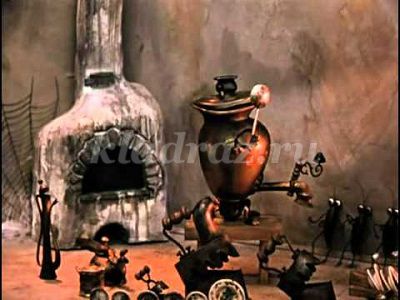
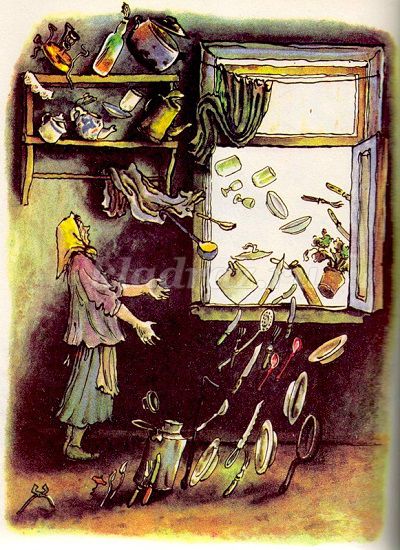
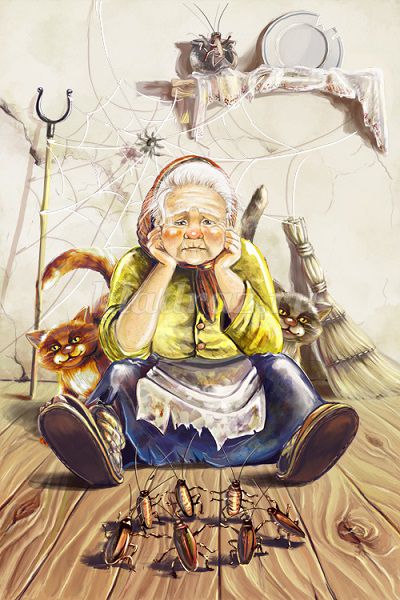
Moidodyr comes out: I am the great washbasin, my name is Moidodyr, I am glad to come to you for the holiday, but what happened here?
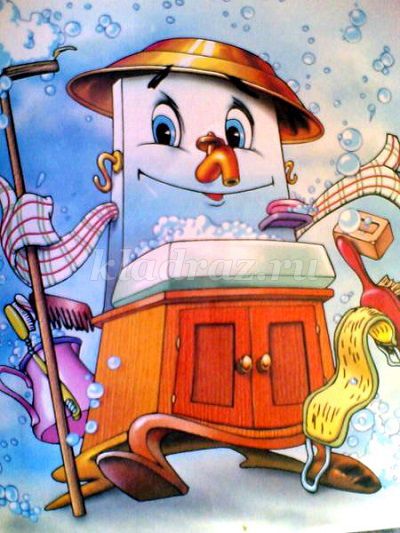
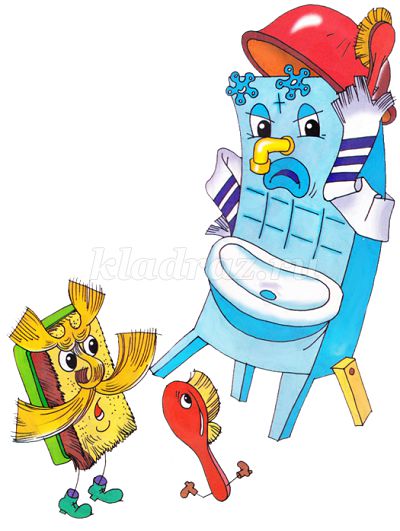
- You, Fedora, comb his hair and take off his dirty dress.
Smile, Fedora, for us, on the holiday of grandmothers and mothers! (clean Fedora appears)
- So you have become neat and beautiful and pleasant!
Let's teach Fedora how to clean, guys. Attraction games: - Cleaning and lunch - Carry the potatoes in a spoon along the winding path - Remove Fyodor's trash:
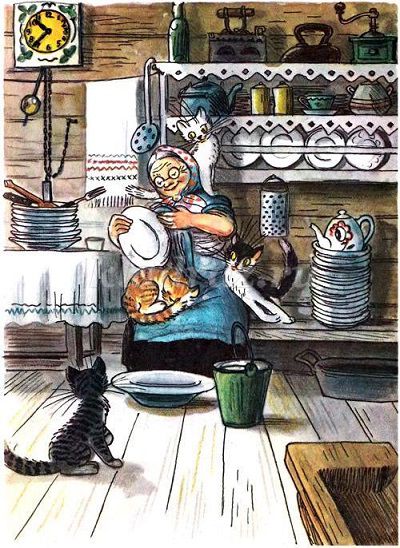
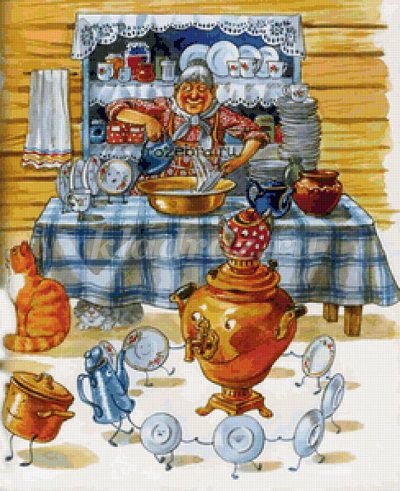
Rolling pin: Fedora needs a rolling pin, Without me Fedora is miserable, I will roll the dough and treat him to pies. Cup: Cups are also here, are they baking pies in the oven? I’ll pour some tea into a cup and give it to Fyodor. Spoon: I will not be her enemy, Drink some tea and pie. Saucer: Here are the cutie saucers. How can there be a saucer without a cup? Iron: We will iron all the sheets, towels and scarves. You, Fedora, don’t be lazy, start ironing quickly. Knife: Well, I’ll respect you, I’ll butter your bread. Plate: And the plates are right there. They serve her a sandwich.
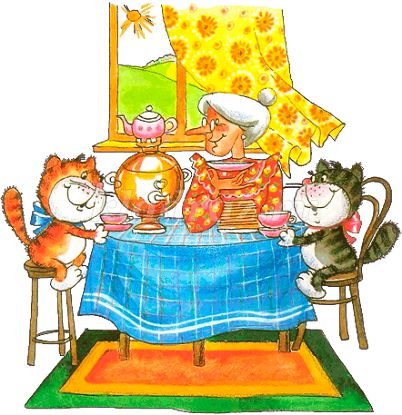
We recommend watching:
Staging a fairy tale in the middle group in kindergarten Fairy tale "Teremok". Scenario for children by roles Dramatization in the middle group based on the fairy tale: Teremok Dramatizations for preschool children
Similar articles:
Dramatization of Chukovsky's fairy tale The Fly Tsokotukha for children 5-7 years old
A dramatization of a fairy tale about a grandmother for older children
A dramatization of a fairy tale for children 4-5 years old. How Jack went looking for happiness
Role-playing of a fairy tale for preschoolers in kindergarten
Dramatization for children of senior preschool age in kindergarten
